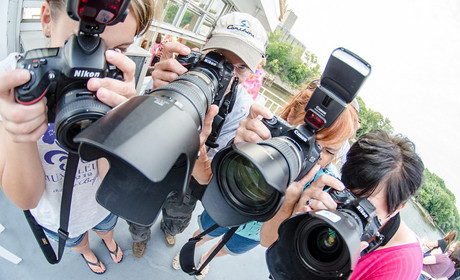
A new portfolio site has launched which aims to protect copyright for photographers.
Pixelrights is the brainchild of Shaun Curry, a photojournalist who has worked with Agence France-Presse and the Financial Times.
Speaking to Journalism.co.uk, Curry explained he had built the site to offer photographers a tool which is simple to use and acts as anti-circumvention technology to protect their work.
"As a photographer I displayed my work online and found that my pictures were often listed, shared about without permission," he said.
A key feature of Pixelrights, which launched 27 October, is the use of 'smart frame' technology to avoid the unauthorised use of images uploaded to the portfolios.
The frame includes the photographer's name and a caption for the image, as well as optional features to share the photo on social media sites such as Twitter, Facebook, or Pinterest.
The smart frame is also "jpeg-less", said Curry, so an uploaded image is "scrambled and reproduced onto your website so what you're looking at isn't a jpeg, it's like an interactive frame".What we are doing is raising awareness of digital content and how it is actually owned and created by someone.Shaun Curry, Pixelrights
Having 'jpeg-less' display means people can no longer right click on the image and download it on their device.
"We have the author's attribution constantly hard-wired into that smart frame," he said.
"If you then embed that anywhere on the internet, the photographer's name is always there and the caption is always there, it cannot be removed."
The frame can either be enabled permanently or set to appear when a user hovers over the image.
Pixelrights also features a screenshot deterrent to discourage people from reproducing images without permission. Whenever someone attempts to screengrab, a warning box with a legal notice is displayed.
"What we are doing is raising awareness of digital content and how it is actually owned and created by someone," said Curry, "rather than Google Images turning into a stock library where people just go and get any picture they want... and then publish it without any attribution at the very least."
He added that Pixelrights has been working with a law firm to classify its 'smart frame' as anti-circumvention technology, which is "much more culpable" under copyright law.
Curry also highlighted the legal case between freelance photographer Daniel Morel and AFP and Getty Images, after pictures uploaded by the photographer on Twitter were distributed without permission.
The case lasted over three years before Morel was awarded damages, and Curry said if Twitter had been using some form of anti-circumvention technology, the dispute would only have lasted a few months.
Another useful services for photographers who wish to license their images to the media is PicFair, which launched last year.
Photographers can also add watermarks and metadata to photos distributed online or shared on social media, using the iOS app Marksta.
- Pixelrights membership is available for £9.99 a month following a 14-day free trial.
Free daily newsletter
If you like our news and feature articles, you can sign up to receive our free daily (Mon-Fri) email newsletter (mobile friendly).
Related articles
- Seven sources of free images for journalists
- Reuters publishes book to honour life of late photojournalist Danish Siddiqui
- Five golden rules for using images to engage readers with your story
- Tip: Safety tips for photojournalists in the time of covid-19
- Solutions photojournalism: “If you can capture all the problems with a photo, why can’t you capture the solutions?"









